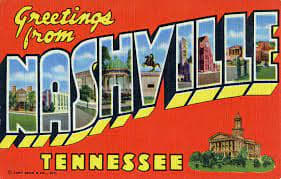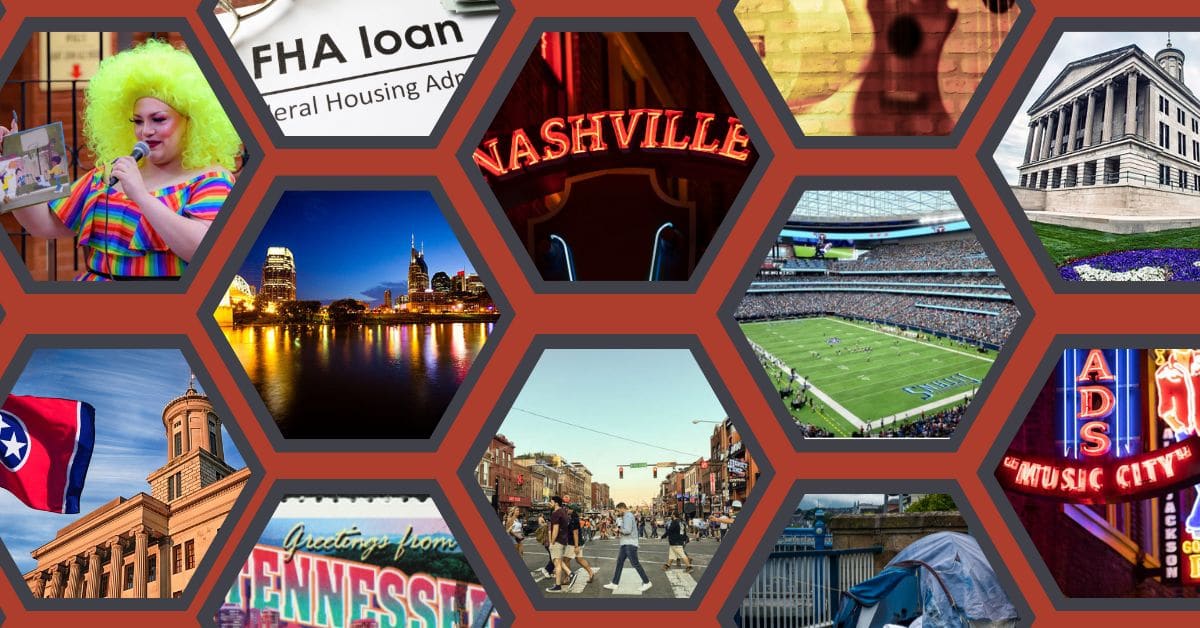
History of Nashville Metropolitan Council
Are you ready to vote on August 3?
Take Action Now - On April 25, there will be a public hearing and a final vote on Mayor John Cooper's proposed $2.1 billion financing plan for a new Titans stadium. Click here for info on how to attend the hearing.
Metro Council Begins
The Nashville Metropolitan Council, also known as the Metro Council, was established in 1963.
Prior to the creation of the Metropolitan Council, Nashville and Davidson County operated as separate entities with distinct government structures. As the city expanded rapidly throughout the mid-20th century, residents and politicians recognized the need for a consolidated, streamlined government.
Nashville and Davidson County formed a unique partnership, merging their respective governments into a single unified entity, known as the Metropolitan Government of Nashville and Davidson County.
The charter that established the Metropolitan Government also created the Nashville Metropolitan Council, a 40-member legislative body responsible for governing the city and its surrounding county. In 2015, the Metro Council shifted to a system where 35 members were elected from specific districts, and five members were elected city-wide.
In 2023, Republican state lawmakers and Governor Bill Lee passed a bill to reduce Nashville's 40-member metro council by half after the Democratic-learning Metro Council refused to host the 2024 Republican National Convention. The move has been temporarily blocked by three state court trial judges, citing a "compelling public interest in preserving the integrity of the Metro election process that is already underway.”

Metro Council's Major Accomplishments
Historical Milestones
Transit and Infrastructure
-
Nashville MTA: Established in 1973, the Nashville Metropolitan Transit Authority (MTA) has played a crucial role in connecting the city's residents and visitors through a network of buses and paratransit services. Over the years, the council has supported the expansion and modernization of the MTA to improve service quality, accessibility, and reliability.
-
Music City Center: Opened in 2013, the Music City Center is a 2.1-million-square-foot convention center that has become a central hub for events and conferences in Nashville. The council's investment in this project not only boosted the local economy but also contributed to the revitalization of downtown Nashville.
-
Bicentennial Capitol Mall State Park: Completed in 1996, this 19-acre park commemorates Tennessee's Bicentennial celebration and showcases the state's rich history. The council played a vital role in its development, transforming a once underutilized area into a popular tourist destination and community gathering space.
Environmental Sustainability
-
Nashville Office of Environment and Sustainability: Since its inception in 2009, this office has guided the city's efforts to become more sustainable and environmentally conscious-- including recycling initiatives, tree planting campaigns, and green building certifications.
-
Climate Action Plan: In 2019, the council approved Nashville's first-ever comprehensive Climate Action Plan, which outlined strategies to reduce greenhouse gas emissions, enhance resiliency, and promote sustainable practices throughout the city.
Affordable Housing
-
Barnes Fund for Affordable Housing: The establishment of the Barnes Fund in 2013 demonstrated the council's commitment to addressing Nashville's affordable housing crisis. Since then, the fund has facilitated the creation and preservation of thousands of affordable housing units through grants, loans, and land donations.
-
Inclusionary Housing Policy: To ensure that new developments contribute to the city's affordable housing stock, the council enacted an inclusionary housing policy in 2016. This policy requires developers to include a certain percentage of affordable units in their projects or pay into the Barnes Fund to support affordable housing elsewhere in the city.
Public Safety
-
New Police Headquarters: In 2017, the council approved the construction of a new police headquarters in Nashville, providing state-of-the-art facilities and resources to better serve and protect the community.
-
Community Oversight Board: The creation of the Community Oversight Board in 2018 marked a significant step towards promoting transparency, accountability, and trust between the Nashville police department and the communities they serve. The board - an independent entity - has the authority to review allegations of police misconduct and make policy recommendations.
Recent Metro Council Actions
-
Approved the Tennessee Titans Stadium: Majority Metro Council members voted in favor of constructing a new stadium for the Tennessee Titans. The $2.1 billion stadium was found to be more cost-effective than renovating the Nissan Stadium and will be funded by a 1% increase in Davidson County's hotel tax and other sources. Advocacy groups worry the move may divert resources from other important city needs. Residents urged council members to prioritize affordable housing and public safety.
-
A public hearing and a final vote are scheduled for April 25. Find info on attending here.
-
- Invested in affordable housing: In 2022, Metro Council approved the Mixed Income PILOT, which allows landlords to pay lower taxes if they provide affordable housing.
- American Rescue Plan allocation: The Metro Council helped decide how to use the American Rescue Plan funds, allocating $40 million to support and train healthcare workers and create better job opportunities in underserved communities.
- Grant to Planned Parenthood: The Metro Council approved a $500,000 grant to Planned Parenthood for sex education and supplies, using money set aside by the Metropolitan Council Office, the Mayor's Office, and the Nashville Department of Transportation.
- Approved Oracle business hub: In 2021, the Metro Council approved a $1.2 billion investment plan by Oracle Corp to transform the East Bank of Cumberland River into the city's largest business hub.
- In December 2019, Mayor John Cooper submitted a proposal to recognize Juneteenth National Independence Day as a paid holiday for Metro employees in Nashville and Davidson County.
- Legalized cannabis: In 2016, the Metro Council approved a measure to lessen penalties for small amounts of marijuana
The 2023 Nashville Metropolitan General Election will take place on August 3, 2023.
Find out everything you need to know to vote or run in the elections here.
The Latest
-
 Changes are almost here!It's almost time for Causes bold new look—and a bigger mission. We’ve reimagined the experience to better connect people with read more...
Changes are almost here!It's almost time for Causes bold new look—and a bigger mission. We’ve reimagined the experience to better connect people with read more... -
 The Long Arc: Taking Action in Times of Change“Change does not roll in on the wheels of inevitability, but comes through continuous struggle.” Martin Luther King Jr. Today in read more... Advocacy
The Long Arc: Taking Action in Times of Change“Change does not roll in on the wheels of inevitability, but comes through continuous struggle.” Martin Luther King Jr. Today in read more... Advocacy -
 Thousands Displaced as Climate Change Fuels Wildfire Catastrophe in Los AngelesIt's been a week of unprecedented destruction in Los Angeles. So far the Palisades, Eaton and other fires have burned 35,000 read more... Environment
Thousands Displaced as Climate Change Fuels Wildfire Catastrophe in Los AngelesIt's been a week of unprecedented destruction in Los Angeles. So far the Palisades, Eaton and other fires have burned 35,000 read more... Environment -
 Puberty, Privacy, and PolicyOn December 11, the Montana Supreme Court temporarily blocked SB99 , a law that sought to ban gender-affirming care for read more... Families
Puberty, Privacy, and PolicyOn December 11, the Montana Supreme Court temporarily blocked SB99 , a law that sought to ban gender-affirming care for read more... Families

 Climate & Consumption
Climate & Consumption
 Health & Hunger
Health & Hunger
 Politics & Policy
Politics & Policy
 Safety & Security
Safety & Security
